EML: Managing Pay, Working Time, Performance & Discipline Lawfully
VerifiedAdded on 2023/06/18
|11
|1045
|200
Presentation
AI Summary
This presentation provides an overview of key aspects of employment law, focusing on managing pay, working time, performance, and disciplinary matters lawfully. It discusses recent changes to the National Minimum/Living Wage, Working Time Regulations regarding holiday pay and working time for mobile/field-based workers, Equal Pay provisions of the Equality Act and gender gap reporting, Maternity, Paternity, Adoption Rights and Shared Parental Leave, and the Right to be accompanied at formal meetings. The presentation also highlights good practices in managing capability and conduct, referencing the Employment Rights Act 1996. The conclusion emphasizes that employment law primarily aims to protect employee rights and prevent exploitation, encompassing various statutes related to minimum wages, holidays, and parental leaves. Desklib provides this document and many others for students to use as a resource.
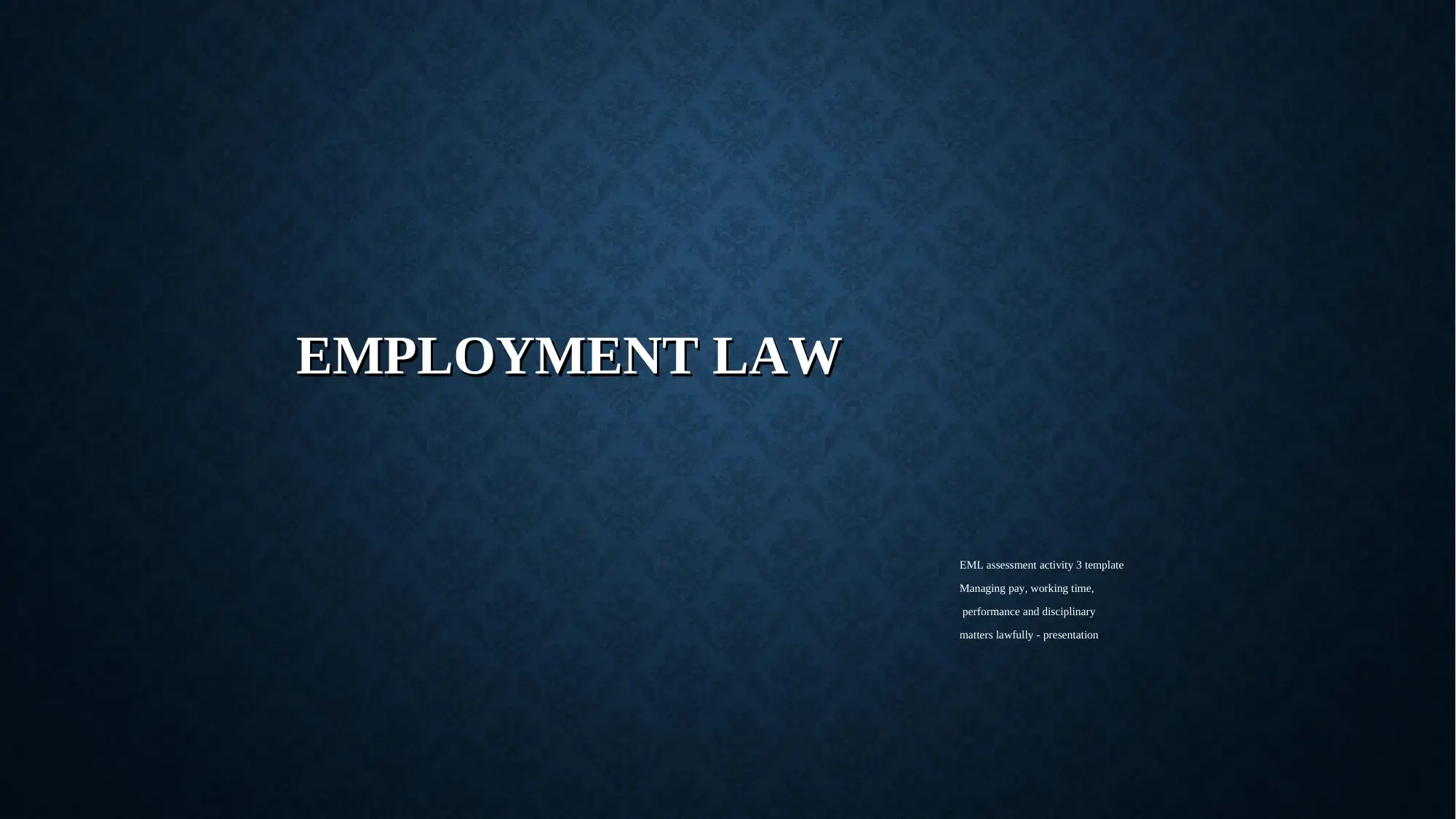
EMPLOYMENT LAWEMPLOYMENT LAW
EML assessment activity 3 template
Managing pay, working time,
performance and disciplinary
matters lawfully - presentation
EML assessment activity 3 template
Managing pay, working time,
performance and disciplinary
matters lawfully - presentation
Paraphrase This Document
Need a fresh take? Get an instant paraphrase of this document with our AI Paraphraser
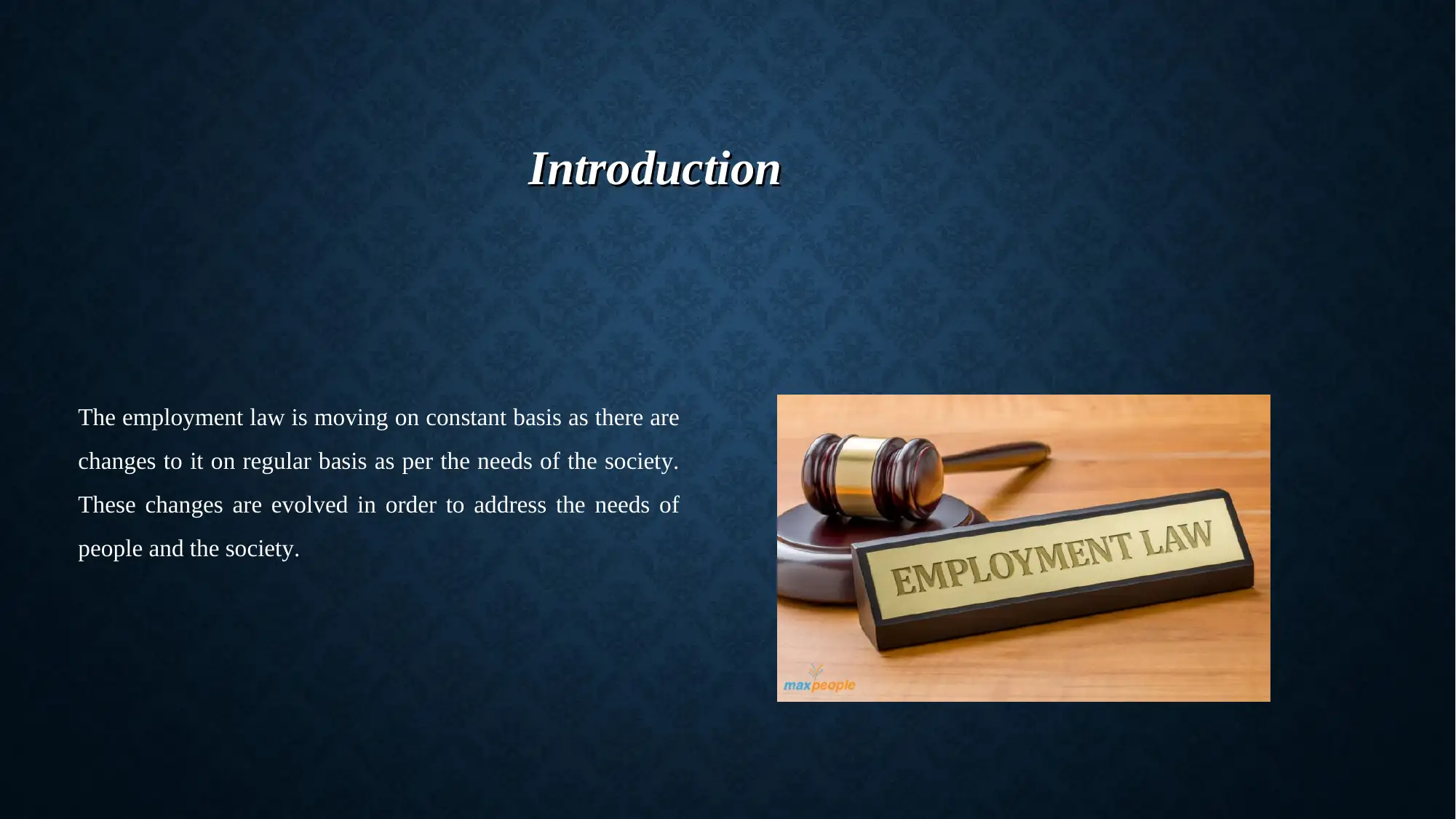
IntroductionIntroduction
The employment law is moving on constant basis as there are
changes to it on regular basis as per the needs of the society.
These changes are evolved in order to address the needs of
people and the society.
The employment law is moving on constant basis as there are
changes to it on regular basis as per the needs of the society.
These changes are evolved in order to address the needs of
people and the society.
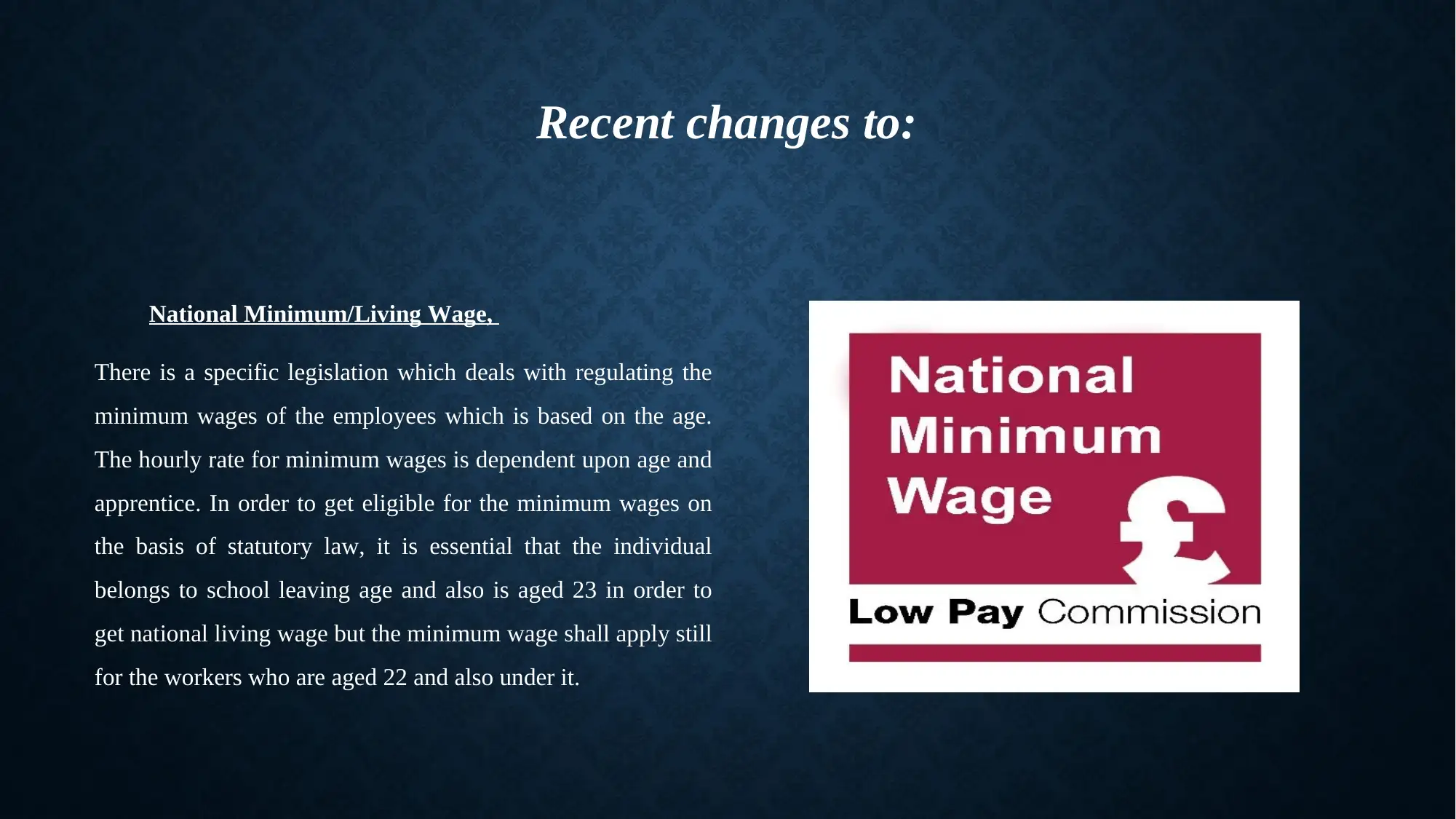
Recent changes to:
National Minimum/Living Wage,
There is a specific legislation which deals with regulating the
minimum wages of the employees which is based on the age.
The hourly rate for minimum wages is dependent upon age and
apprentice. In order to get eligible for the minimum wages on
the basis of statutory law, it is essential that the individual
belongs to school leaving age and also is aged 23 in order to
get national living wage but the minimum wage shall apply still
for the workers who are aged 22 and also under it.
National Minimum/Living Wage,
There is a specific legislation which deals with regulating the
minimum wages of the employees which is based on the age.
The hourly rate for minimum wages is dependent upon age and
apprentice. In order to get eligible for the minimum wages on
the basis of statutory law, it is essential that the individual
belongs to school leaving age and also is aged 23 in order to
get national living wage but the minimum wage shall apply still
for the workers who are aged 22 and also under it.
⊘ This is a preview!⊘
Do you want full access?
Subscribe today to unlock all pages.

Trusted by 1+ million students worldwide
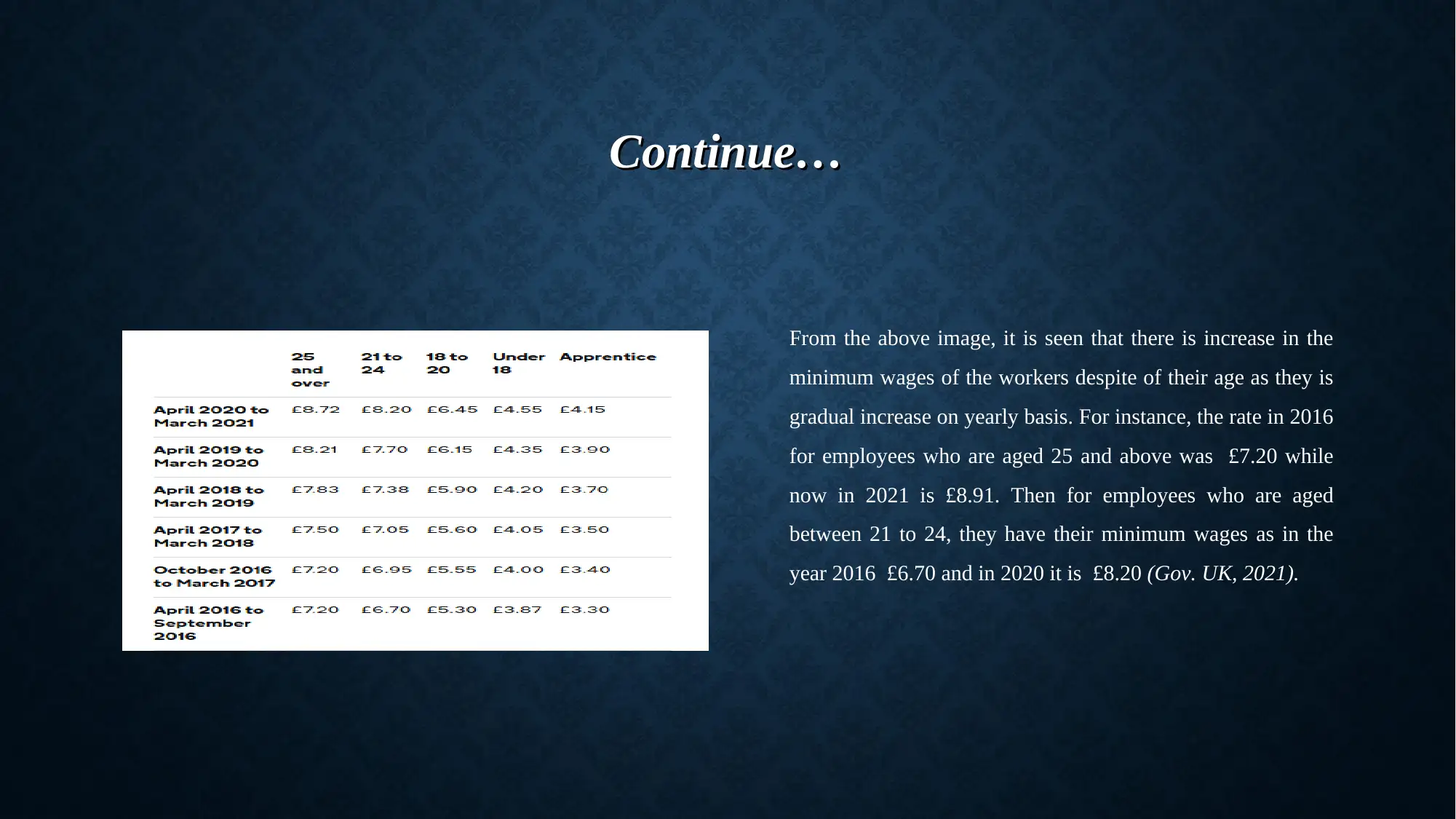
Continue…Continue…
From the above image, it is seen that there is increase in the
minimum wages of the workers despite of their age as they is
gradual increase on yearly basis. For instance, the rate in 2016
for employees who are aged 25 and above was £7.20 while
now in 2021 is £8.91. Then for employees who are aged
between 21 to 24, they have their minimum wages as in the
year 2016 £6.70 and in 2020 it is £8.20 (Gov. UK, 2021).
From the above image, it is seen that there is increase in the
minimum wages of the workers despite of their age as they is
gradual increase on yearly basis. For instance, the rate in 2016
for employees who are aged 25 and above was £7.20 while
now in 2021 is £8.91. Then for employees who are aged
between 21 to 24, they have their minimum wages as in the
year 2016 £6.70 and in 2020 it is £8.20 (Gov. UK, 2021).
Paraphrase This Document
Need a fresh take? Get an instant paraphrase of this document with our AI Paraphraser

Working Time Regulations Regarding Holiday Pay And
Working Time For Mobile/Field-based Workers
The working time regulation is a statutory law which is aimed to
implement EU's worki8ng time directive, 1993. It covers all the
workers and not just the employees, such as contractors or the
sub contractors who are entitled for at least 5.6 weeks paid
holidays on annual basis. The adults are entitled for at least a 20
minutes break (unpaid) in their working day which exceeds
around six hours while the young adults who are aged between 16
to 18 years are required to receive the break of at least 30 minutes
for anything which is over four and the half hours.
Working Time For Mobile/Field-based Workers
The working time regulation is a statutory law which is aimed to
implement EU's worki8ng time directive, 1993. It covers all the
workers and not just the employees, such as contractors or the
sub contractors who are entitled for at least 5.6 weeks paid
holidays on annual basis. The adults are entitled for at least a 20
minutes break (unpaid) in their working day which exceeds
around six hours while the young adults who are aged between 16
to 18 years are required to receive the break of at least 30 minutes
for anything which is over four and the half hours.
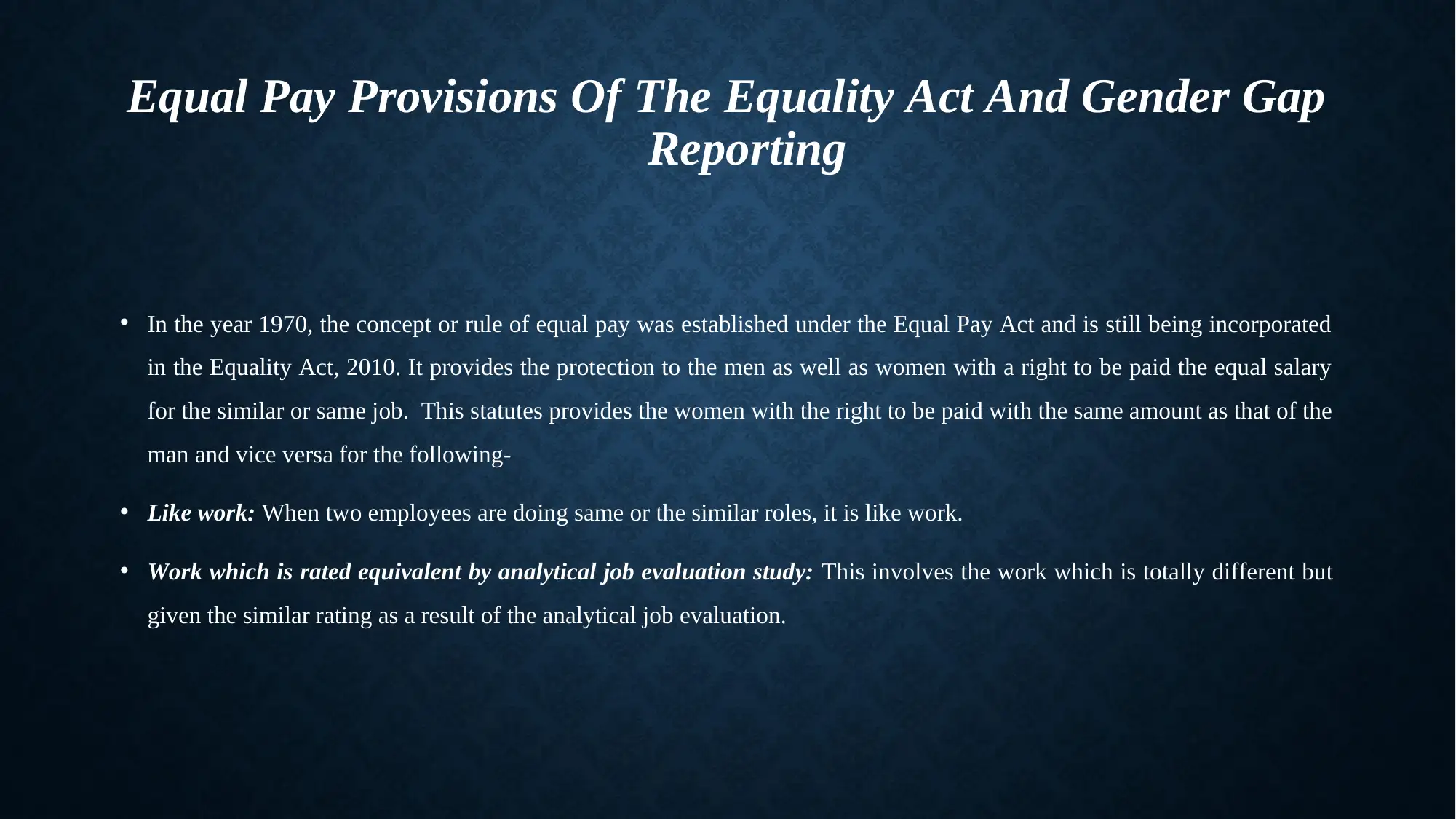
Equal Pay Provisions Of The Equality Act And Gender Gap
Reporting
• In the year 1970, the concept or rule of equal pay was established under the Equal Pay Act and is still being incorporated
in the Equality Act, 2010. It provides the protection to the men as well as women with a right to be paid the equal salary
for the similar or same job. This statutes provides the women with the right to be paid with the same amount as that of the
man and vice versa for the following-
• Like work: When two employees are doing same or the similar roles, it is like work.
• Work which is rated equivalent by analytical job evaluation study: This involves the work which is totally different but
given the similar rating as a result of the analytical job evaluation.
Reporting
• In the year 1970, the concept or rule of equal pay was established under the Equal Pay Act and is still being incorporated
in the Equality Act, 2010. It provides the protection to the men as well as women with a right to be paid the equal salary
for the similar or same job. This statutes provides the women with the right to be paid with the same amount as that of the
man and vice versa for the following-
• Like work: When two employees are doing same or the similar roles, it is like work.
• Work which is rated equivalent by analytical job evaluation study: This involves the work which is totally different but
given the similar rating as a result of the analytical job evaluation.
⊘ This is a preview!⊘
Do you want full access?
Subscribe today to unlock all pages.

Trusted by 1+ million students worldwide
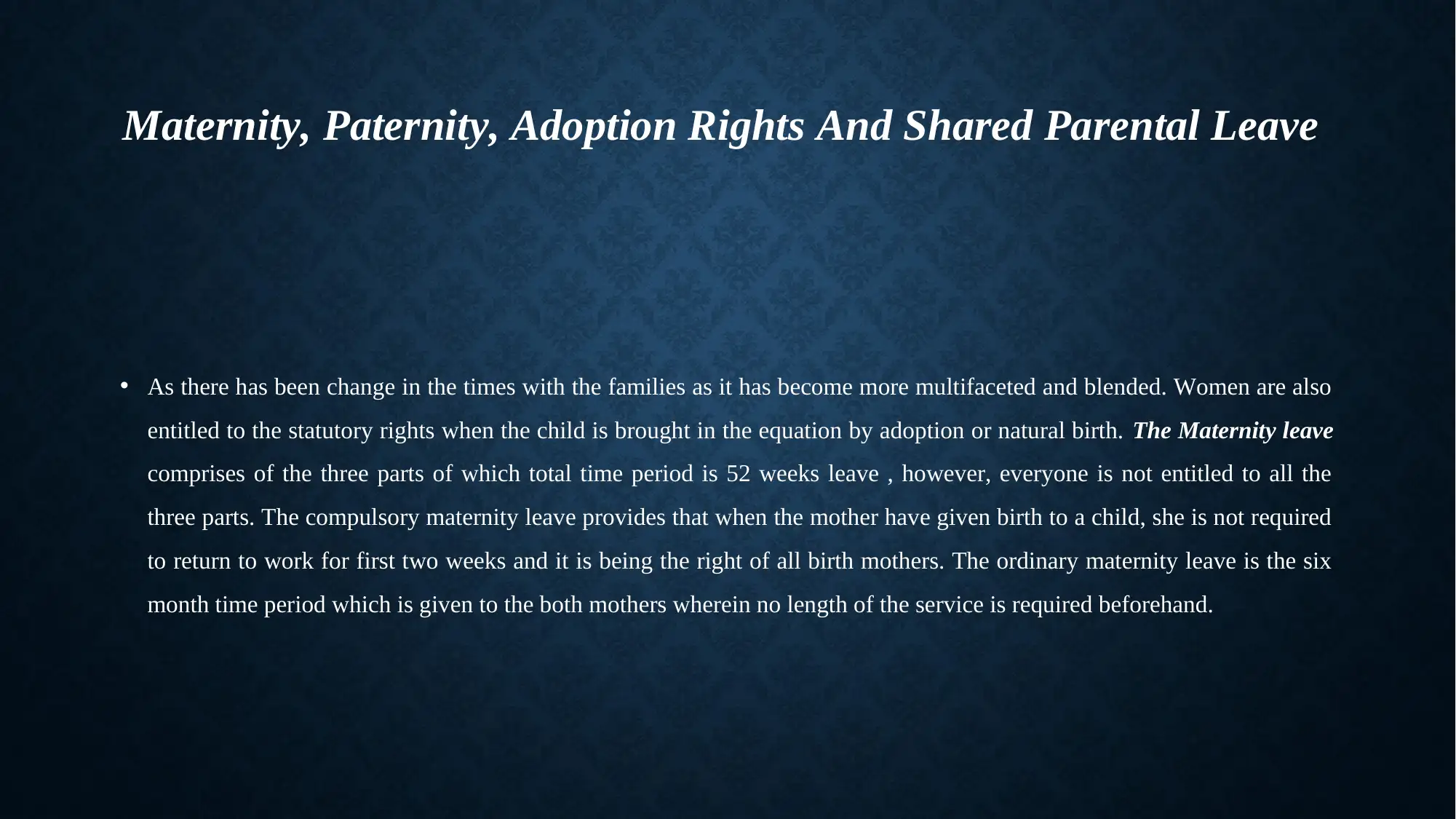
Maternity, Paternity, Adoption Rights And Shared Parental Leave
• As there has been change in the times with the families as it has become more multifaceted and blended. Women are also
entitled to the statutory rights when the child is brought in the equation by adoption or natural birth. The Maternity leave
comprises of the three parts of which total time period is 52 weeks leave , however, everyone is not entitled to all the
three parts. The compulsory maternity leave provides that when the mother have given birth to a child, she is not required
to return to work for first two weeks and it is being the right of all birth mothers. The ordinary maternity leave is the six
month time period which is given to the both mothers wherein no length of the service is required beforehand.
• As there has been change in the times with the families as it has become more multifaceted and blended. Women are also
entitled to the statutory rights when the child is brought in the equation by adoption or natural birth. The Maternity leave
comprises of the three parts of which total time period is 52 weeks leave , however, everyone is not entitled to all the
three parts. The compulsory maternity leave provides that when the mother have given birth to a child, she is not required
to return to work for first two weeks and it is being the right of all birth mothers. The ordinary maternity leave is the six
month time period which is given to the both mothers wherein no length of the service is required beforehand.
Paraphrase This Document
Need a fresh take? Get an instant paraphrase of this document with our AI Paraphraser
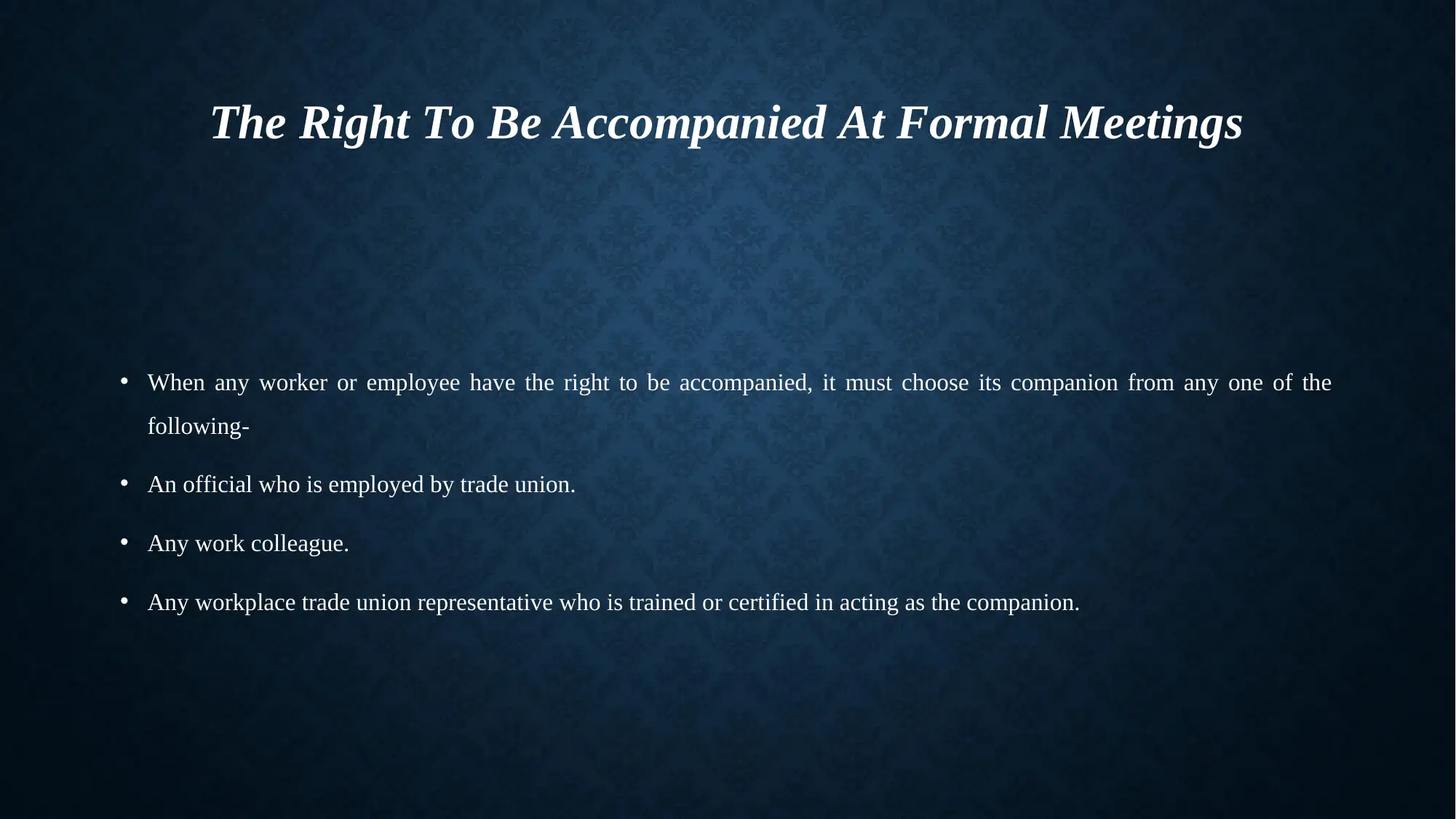
The Right To Be Accompanied At Formal Meetings
• When any worker or employee have the right to be accompanied, it must choose its companion from any one of the
following-
• An official who is employed by trade union.
• Any work colleague.
• Any workplace trade union representative who is trained or certified in acting as the companion.
• When any worker or employee have the right to be accompanied, it must choose its companion from any one of the
following-
• An official who is employed by trade union.
• Any work colleague.
• Any workplace trade union representative who is trained or certified in acting as the companion.
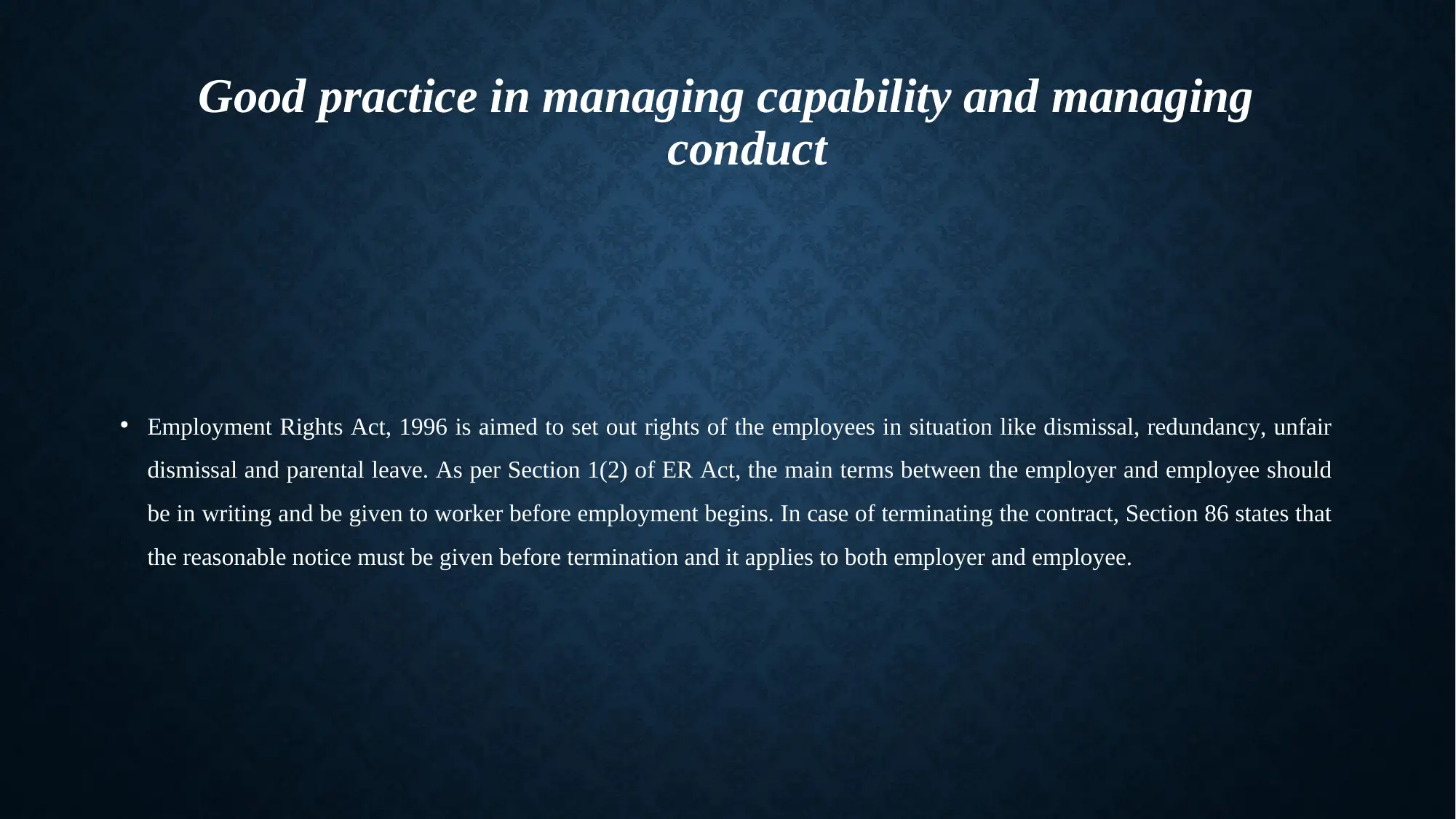
Good practice in managing capability and managing
conduct
• Employment Rights Act, 1996 is aimed to set out rights of the employees in situation like dismissal, redundancy, unfair
dismissal and parental leave. As per Section 1(2) of ER Act, the main terms between the employer and employee should
be in writing and be given to worker before employment begins. In case of terminating the contract, Section 86 states that
the reasonable notice must be given before termination and it applies to both employer and employee.
conduct
• Employment Rights Act, 1996 is aimed to set out rights of the employees in situation like dismissal, redundancy, unfair
dismissal and parental leave. As per Section 1(2) of ER Act, the main terms between the employer and employee should
be in writing and be given to worker before employment begins. In case of terminating the contract, Section 86 states that
the reasonable notice must be given before termination and it applies to both employer and employee.
⊘ This is a preview!⊘
Do you want full access?
Subscribe today to unlock all pages.

Trusted by 1+ million students worldwide
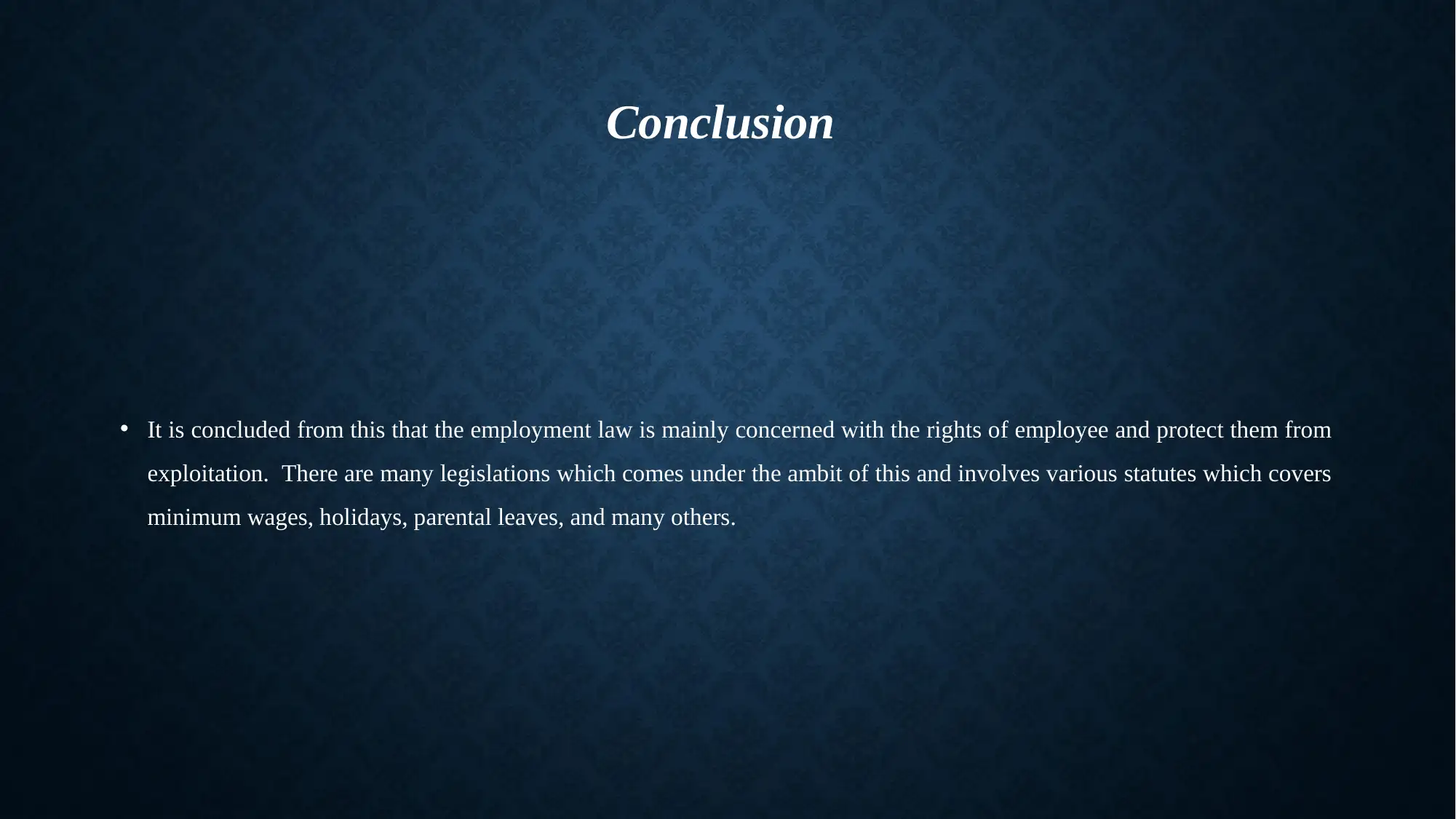
Conclusion
• It is concluded from this that the employment law is mainly concerned with the rights of employee and protect them from
exploitation. There are many legislations which comes under the ambit of this and involves various statutes which covers
minimum wages, holidays, parental leaves, and many others.
• It is concluded from this that the employment law is mainly concerned with the rights of employee and protect them from
exploitation. There are many legislations which comes under the ambit of this and involves various statutes which covers
minimum wages, holidays, parental leaves, and many others.
Paraphrase This Document
Need a fresh take? Get an instant paraphrase of this document with our AI Paraphraser
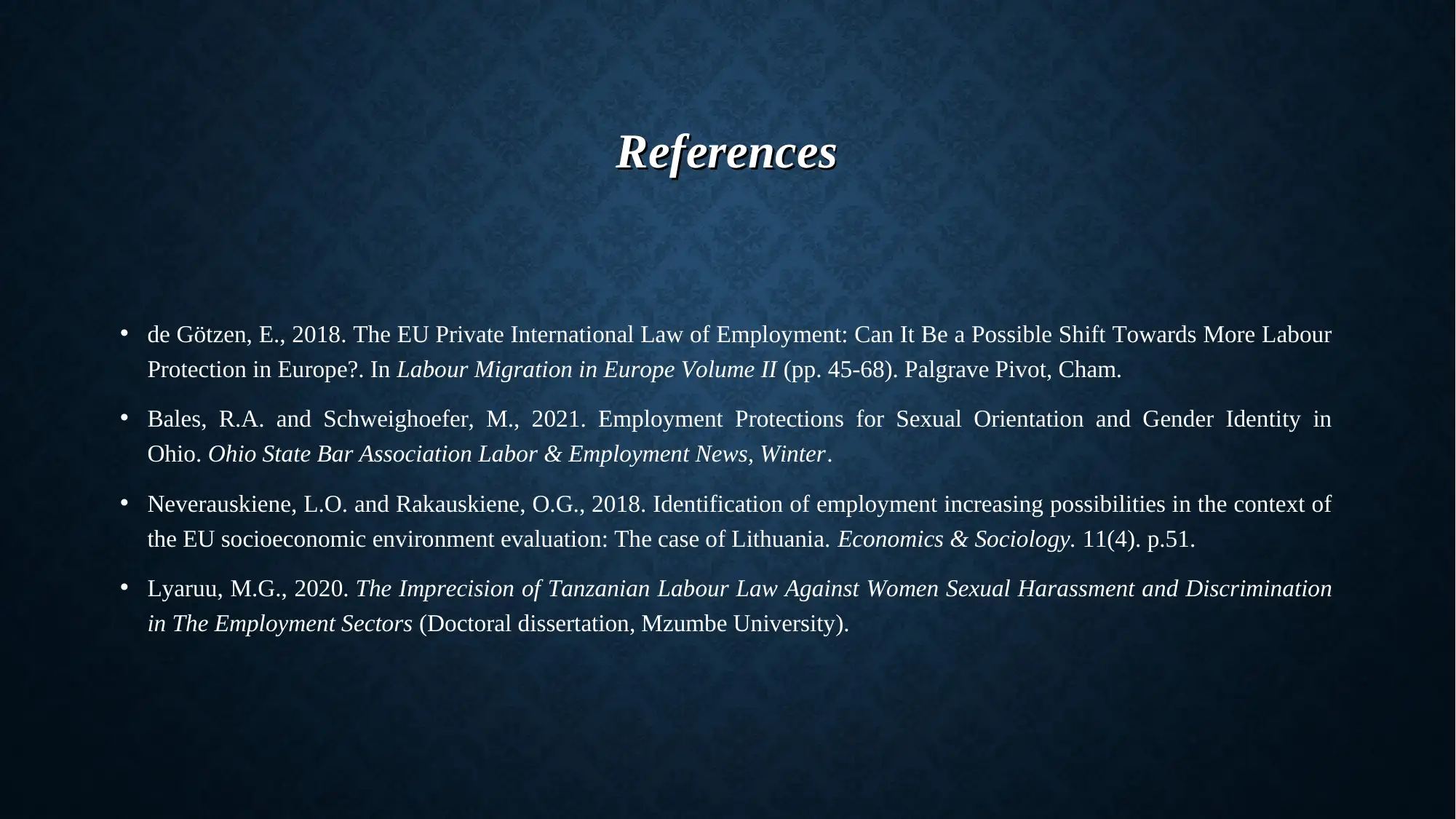
ReferencesReferences
• de Götzen, E., 2018. The EU Private International Law of Employment: Can It Be a Possible Shift Towards More Labour
Protection in Europe?. In Labour Migration in Europe Volume II (pp. 45-68). Palgrave Pivot, Cham.
• Bales, R.A. and Schweighoefer, M., 2021. Employment Protections for Sexual Orientation and Gender Identity in
Ohio. Ohio State Bar Association Labor & Employment News, Winter.
• Neverauskiene, L.O. and Rakauskiene, O.G., 2018. Identification of employment increasing possibilities in the context of
the EU socioeconomic environment evaluation: The case of Lithuania. Economics & Sociology. 11(4). p.51.
• Lyaruu, M.G., 2020. The Imprecision of Tanzanian Labour Law Against Women Sexual Harassment and Discrimination
in The Employment Sectors (Doctoral dissertation, Mzumbe University).
• de Götzen, E., 2018. The EU Private International Law of Employment: Can It Be a Possible Shift Towards More Labour
Protection in Europe?. In Labour Migration in Europe Volume II (pp. 45-68). Palgrave Pivot, Cham.
• Bales, R.A. and Schweighoefer, M., 2021. Employment Protections for Sexual Orientation and Gender Identity in
Ohio. Ohio State Bar Association Labor & Employment News, Winter.
• Neverauskiene, L.O. and Rakauskiene, O.G., 2018. Identification of employment increasing possibilities in the context of
the EU socioeconomic environment evaluation: The case of Lithuania. Economics & Sociology. 11(4). p.51.
• Lyaruu, M.G., 2020. The Imprecision of Tanzanian Labour Law Against Women Sexual Harassment and Discrimination
in The Employment Sectors (Doctoral dissertation, Mzumbe University).
1 out of 11
Related Documents
Your All-in-One AI-Powered Toolkit for Academic Success.
+13062052269
info@desklib.com
Available 24*7 on WhatsApp / Email
![[object Object]](/_next/static/media/star-bottom.7253800d.svg)
Unlock your academic potential
Copyright © 2020–2026 A2Z Services. All Rights Reserved. Developed and managed by ZUCOL.




